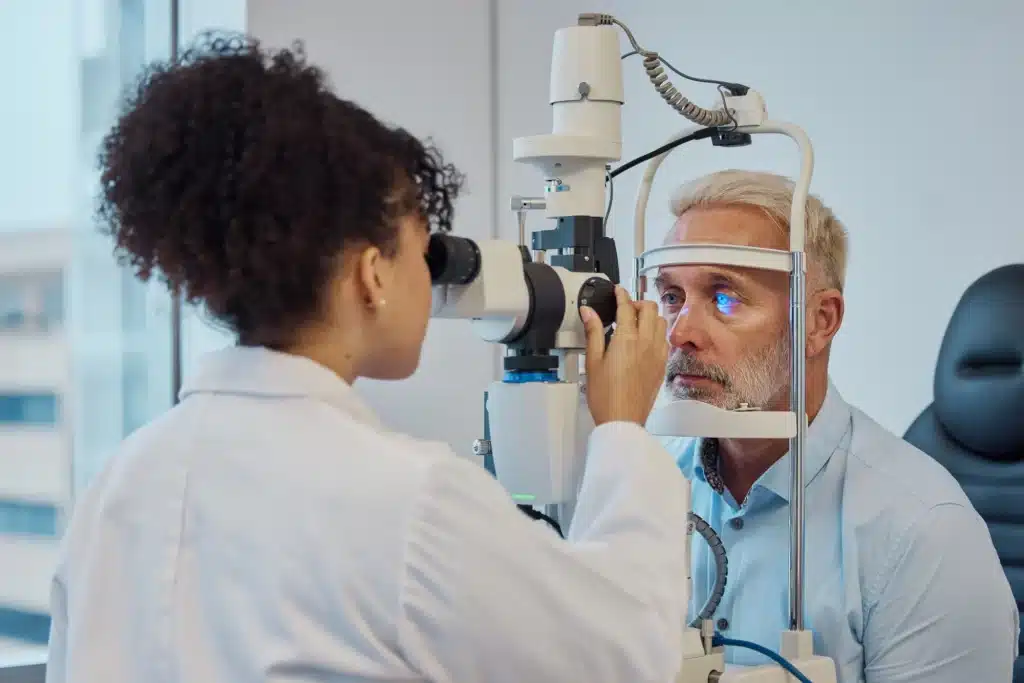Medically Reviewed by: Paul J. Stewart M.D.
The Most Common Signs of Macular Degeneration
Since there is currently no cure for the disease, catching the signs of macular degeneration can be critical for the future of your vision. If you watch for the early signs of macular degeneration, it might be possible to slow down the progression of this particular eye disease.
Your susceptibility to this disease grows as you age, and it is becoming increasingly common for those over the age of 70 to be diagnosed with some degree of macular degeneration. In fact, as far as common vision problems go, macular degeneration is one of the leading causes of vision loss in older adults.
Before we cover the early signs of macular degeneration, we will quickly review the various causes and types of this eye disease. We also cover this information more in-depth in our article, What is Macular Degeneration? If you are already familiar with this information, simply skip directly to the early signs of macular degeneration.
What is the main cause of macular degeneration?
The exact cause of macular degeneration is unknown. However, as mentioned previously, your susceptibility to macular degeneration increases as you age, so in some sense, aging is considered a main cause of the disease.
There are other factors that can make you even more susceptible. These factors can include:
- Lifestyle habits such as smoking and lack of exercise
- Gender, as women may be more at risk
- Family genes.
If you fall under any of these categories, then you will want to monitor for the signs of macular degeneration regularly.
The cause of the physical symptoms of macular degeneration is the wearing down of the central part of your retina. The retina is made of tissue at the back of your eye and is composed of light-sensitive cells (called rods and cones). When these become worn down you begin to experience vision loss, especially central vision loss.
What are the different types of macular degeneration?
There are two types of macular degeneration: dry macular generation (non-neovascular) and wet macular degeneration (neovascular).
What you should know about dry macular degeneration:
- The most common type of macular degeneration
- Not as serious as wet macular degeneration
- Minimal vision loss typically experienced
- Development of drusen (small yellow or white spots on the retina) upon accumulation of waste products
What you should know about wet macular degeneration:
- The more serious (albeit the less common) type of macular degeneration
- Leads to the formation of new blood vessels causing fluids or blood to leak into the retina
- Vision might appear wavy or distorted
FAQ: Are floaters a symptom of macular degeneration?
Typically, no. The spots in your vision created by macular degeneration can be confused with floaters but, with the exception of late-stage wet macular degeneration, macular degeneration itself rarely causes floaters.
What are the common signs of macular degeneration?
With macular degeneration, your vision will generally gradually become less clear and more blurry. Day-to-day life and activities like driving, using your smartphone, reading, and even recognizing people may feel difficult or problematic. Here, we break down the common signs of macular degeneration a little further.
Difficulty adapting to changing light
If you have trouble with lighting changes, this may be a sign of macular degeneration. With this particular sign, you may have issues with levels of light suddenly changing. For example, if you go from a dark room to a light room (or vice versa), your eyes might struggle to adapt. You may also have issues performing simple tasks without a high level of light present.
Issues with depth, color, and texture perception
This particular sign of macular degeneration can affect you in a variety of ways — all of which can be somewhat dangerous given the situation. In this case, you may have trouble judging how close or far away something is. You may also have trouble judging similar colors or textures. In both cases, you can be more susceptible to falling or tripping.
Spotted vision
Macular degeneration can also come with dark spotting in your line of vision. This might present itself as just a blurry spot or it could be a dark or shadow-like blurry spot.
Overall blurring
While you may have a blurry spot in your line of vision, you could just have altogether blurrier vision. This could mean difficulty trying to recognize faces, reading books or labels, or using digital devices.
Macular degeneration treatment
Once macular degeneration sets in, you can’t get rid of it; there is no cure. So if you’re over the age of 50 and notice that your eyesight is getting worse or other signs of macular degeneration, we encourage you to schedule an appointment with a retina specialist in Houston. Spot it early, and you can avoid additional vision loss.
Macular degeneration treatments for helping you to reduce further damage and, in the case of wet macular degeneration, manage side effects.
Treatment options for dry macular degeneration:
- Nutritional supplements
- Sunglasses (eye protection)
- Healthy lifestyle choices
- Monitoring blood pressure and cholesterol
Treatment options for wet macular degeneration:
- Injections directly into the eye
- Laser procedures
- Healthy lifestyle choices
Many of these treatments boil down to simply doing right by your body. Keep in mind, however, that many of these treatments can help prevent macular degeneration as well.
Detect signs of macular degeneration early at Eye Center of Texas
Eye Center of Texas is home to some of the most skilled Houston ophthalmologists. We have experience detecting and treating macular degeneration, and we help hundreds of Texans protect and correct their vision every year.
If you think you’re experiencing signs of macular degeneration or if you’d like more information on this common eye disease, schedule an appointment today or give us a call at 713-797-1010.
More Helpful Articles by Eye Center of Texas
Related Articles
Financing Options Available
Apply today to find a financing option that meets your needs.
Our Locations
Houston/Bellaire
6565 W. Loop S., Suite 650Bellaire, TX 77401
Medical Office:
713-797-1010
Medical Fax:
713-357-7276
LASIK/Near Vision:
Office: 713-395-1515
Fax: 713-357-7278
Pasadena
4415 Crenshaw RoadPasadena, TX 77504
Medical Office:
281-977-8800
Medical Fax:
281-977-8877
Sugar Land
15200 S.W. Freeway, Suite 130Sugar Land, TX 77478
Medical Office:
281-277-1010
Medical Fax:
281-277-4504
Clear Lake
455 E. Medical Center Blvd., Suite 110Webster, TX 77598
Medical Office:
281-332-1397
Medical Fax:
281-282-9152
Katy
Greenhouse Medical Plaza2051 Greenhouse Road, Suite 110
Houston, TX 77084
Medical Office:
346-547-7070
Medical Fax:
281-214-2971
The Woodlands/Conroe
100 Medical Center Blvd., Suite 118Conroe, TX 77304
Medical Office:
936-647-1610
Medical Fax:
936-647-1620


